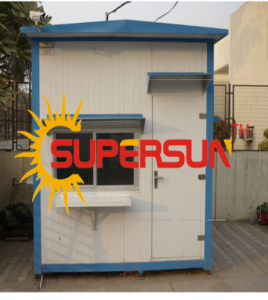
A porta cabin, also known as a portable cabin or modular cabin, is a type of temporary or semi-permanent structure that is designed to be easily transported and installed in various locations. It is typically made from prefabricated materials such as steel or wood and is used for a variety of purposes, including office space, accommodation, storage, or site facilities.
Porta cabins are often used in construction sites, remote areas, events, or temporary office spaces where a quick and convenient solution is required. They can be easily assembled, disassembled, and relocated as needed. These cabins are built to be sturdy and weatherproof, providing a comfortable and functional space for various applications.
Porta cabins can be customized and equipped with amenities such as windows, doors, air conditioning, electrical outlets, insulation, lighting, and furniture. They come in different sizes and configurations, ranging from small single-room units to larger structures with multiple rooms and facilities.
Overall, porta cabins offer a flexible and cost-effective solution for temporary or semi-permanent infrastructure needs, providing convenient and comfortable spaces that can be easily transported and installed in different locations.
Which material is best for porta cabin?
The choice of material for a porta cabin depends on several factors, including the intended use, budget, durability requirements, and environmental conditions. Here are some commonly used materials for porta cabins:
Steel: Steel is a popular choice for porta cabins due to its strength, durability, and resistance to harsh weather conditions. Steel cabins are sturdy, fire-resistant, and offer good security. They can withstand heavy loads and are often used in construction sites or areas prone to extreme weather.
Wood: Wood is another commonly used material for porta cabins, especially for smaller or more temporary structures. Wood offers natural insulation properties and a more aesthetic appearance. However, it may require more maintenance and is not as durable as steel in certain environments.
Aluminum: Aluminum is lightweight, corrosion-resistant, and easy to transport. It is commonly used for portable cabins that require frequent relocation. Aluminum cabins are suitable for moderate weather conditions but may not provide the same level of durability as steel.
Fiberglass: Fiberglass is a lightweight and durable material that is resistant to corrosion, moisture, and pests. It offers good insulation properties and can be a suitable choice for porta cabins intended for harsh environments or areas near the coast.
The selection of the best material for a porta cabin depends on the specific requirements of the project. It is recommended to consult with professionals or suppliers who specialize in porta cabins to determine the most suitable material based on your needs and budget.
Porta Cabin Wall Thickness
The thickness of a porta cabin can vary depending on factors such as the material used, purpose of the cabin, and the specific requirements of the project. However, here are some general guidelines regarding the thickness of porta cabins made from common materials:
Steel: Steel porta cabins typically have wall panels with a thickness ranging from 0.5mm to 1.2mm. The thickness may vary depending on the size and structural requirements of the cabin.
Wood: The thickness of wood used in porta cabins can vary depending on the type of wood and the desired level of insulation. Generally, wood panels with a thickness of 25mm to 50mm are commonly used.
Aluminum: Aluminum porta cabins usually have wall panels with a thickness ranging from 0.7mm to 1.5mm. Thicker panels may be used for larger or more durable structures.
It’s important to note that these thickness ranges are general guidelines and can vary depending on the specific manufacturer, design, and customization options of the porta cabin. Additionally, the thickness of other components such as the roof, floor, and doors may also vary. It is recommended to consult with porta cabin suppliers or manufacturers to determine the appropriate thickness for your specific requirements.
